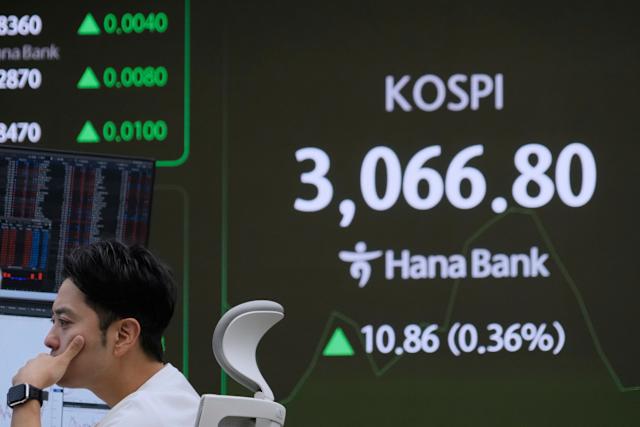
BANGKOK (AP) — Asian shares started the week with gains after U.S. stocks closed at an all-time high following their recovery from the shocks of the Trump administration’s trade policies.
Canada's decision to cancel a plan to tax U.S. technology firms that had led President Donald Trump to halt trade talks helped to steady the markets. U.S. stock futures advanced after Canadian Prime Minister Mark Carney said the talks had resumed.
In Tokyo, the Nikkei 225 climbed 0.8% to 40,487.39.
Hong Kong's Hang Seng lost 0.3% to 24,084.20, while the Shanghai Composite index advanced 0.6% to 3,444.43.
China reported that its factory activity improved slightly in June after Beijing and Washington agreed in May to postpone imposing higher tariffs on each others’ exports, though manufacturing remained in contraction.
In South Korea, the Kospi gained 0.5% to 3,071.70. Australia's S&P/ASX 200 rose 0.3% to 8,542.30.
Taiwan's Taiex lost 1.4% and the Sensex in India was down 0.6%. In Bangkok, the SET gained 0.4%.
On Friday, the S&P 500 rose 0.5% to 6,173.07, above its previous record set in February. The key measure of Wall Street’s health fell nearly 20% from Feb. 19 through April 8.
The Nasdaq composite gained 0.5% to 20,273.46, its own all-time high. The Dow Jones Industrial Average rose 1% to 43,819.27.
The gains on Friday were broad, with nearly every sector within the S&P 500 rising. Nike soared 15.2% for the biggest gain in the market, despite warning of a steep hit from tariffs.
An update on inflation Friday showed prices ticked higher in May, though the rate mostly matched economists' projections.
Inflation remains a big concern. Trump's on-again-off-again tariff policy has made it difficult for companies to make financial forecasts and strained household budgets. A long list of businesses from carmakers to retailers have warned that higher import taxes will likely hurt their revenues and profits.
The U.S. has 10% baseline tariffs on all imported goods, along with higher rates for Chinese goods and other import taxes on steel and autos and the threat of more severe tariffs continues to hang over the economy. The current pause on a round of retaliatory tariffs against a long list of nations is set to expire on July 9. Failure to negotiate deals or further postpone the tariffs could once again rattle investors and consumers.
In an interview with Fox News Channel’s “Sunday Morning Futures,” Trump said his administration will notify countries that the trade penalties will take effect unless there are deals with the United States. Letters will start going out “pretty soon” before the approaching deadline, he said.
繼續閱讀The Federal Reserve is monitoring the tariff situation with a big focus on inflation. The rate of inflation has been stubbornly sitting just above the central bank's target of 2%. In a report Friday, its preferred gauge, the personal consumption expenditures index, rose to 2.3% in May. That's up from 2.2% the previous month.
The Fed cut interest rates three times in late 2024 following a historic series of rate hikes to cool inflation. The PCE was as high as 7.2% in 2022 while the more commonly used consumer price index hit 9.1%.
The Fed hasn't cut rates so far in 2025 over worries that tariffs could reignite inflation and hamper the economy. Economists still expect at least two rate cuts before the end of the year.
Bond yields held relatively steady. The yield on the 10-year Treasury fell to 4.25% from 4.27% late Friday. The two-year Treasury yield, which more closely tracks expectations for what the Federal Reserve will do, stood at 3.73%.
In other dealings early Monday, U.S. benchmark crude oil lost 31 cents to $65.21 per barrel. Brent crude, the international standard, gave up 20 cents to $66.60 per barrel.
The U.S. dollar fell to 144.06 Japanese yen from 144.46 yen. The euro fell $1.1722 from $1.1725.
After the US stock market hits an all-time high, Asian share prices exhibit mixed movements as regional sentiment and other influential factors vary.
Following the US stock market's record high, Asian share prices display varying fortunes as investors weigh global economic news and local sentiment.
US stock market's all-time high has spurred mixed sentiments in Asian shares, with some markets mirroring upward trends while others showcase caution amid global interconnectedness.
Asian share markets exhibit contrasting trends amidst US stocks reaching an all-time high, reflecting varying levels of investor confidence and regional economic dynamics.
Asian stock markets exhibit a mixed performance following the US's achievement of an all-time record high on its equity indices, reflecting regional differences in responses to global financial dynamics and political uncertainties.
The delicate balance between optimism and caution in the Asian share market following US stocks hitting an all-time high reflects investors' anticipation for further global economic growth amidst ongoing geopolitical uncertainties.
The widening gap between US and Asian stock markets following the latter's failure to replicate Wall Street’success, highlights structural differences within global economic recovery leading investors towards cautious sentiments.
The mixed trend of Asian share markets post-US all time high suggests investors remain cautiously optimistic despite global equities reaching historic milestones, highlighting the intricate dynamics in regional investment decisions driven by various economic factors and geopolitical concerns.














